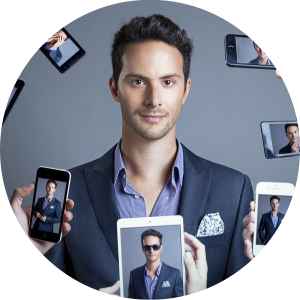
Esteban Contreras is the VP of product at HYP3R, an engagement platform for venues. Previously he was the director of experience design at Sprinklr, an SaaS company that helps large brands create, manage, and optimize social experiences. He also worked as a marketing manager at Samsung where he oversaw the social media activity of the brand in North America.
He is the author of Social State, a well-received book on social media, and also an adviser to early stage startups.
Contreras has been a speaker at several conferences, including SXSW, the Gamification Summit, CES, and the Corporate Social Media Summit.
I asked him about creating professional networks, ways to leverage Twitter, and his reasons for leaving Samsung at the LeWeb conference in Paris.
You previously worked for large corporations. Why did you decide to join a startup?
I think I always had an entrepreneurial heart.
Most people in my family are entrepreneurs, they started newspapers, retail stores, and various other businesses. As I grew up in that environment, I’m used to being accountable and responsible for any work I do.
I was the first one in my family who finished college and pursued a normal career.
I went to work at large brands to understand how they think, and learn as much as I can about a global approach to things, but working at a startup seemed like what I always wanted to do.
I didn’t go to a startup early on, because, in my opinion, I didn’t really have the experience to do that. So I spent the first few years in my career learning about the convergence of technology and marketing, and really going deep into what is possible, and how human beings interact with organizations.
And Sprinklr, which is a startup where I’m working, seemed to understand that world better than anyone else. They saw the vision of how you and I will potentially interact with brands 15, 20, or 30 years from now. And I wanted to be a part of something like that early on, as opposed to waiting until they become a more mature organization.
I was always attracted by the startup world, and I’ve always spent time getting to know people in startups, and it seemed like the right time to do that when I did.
Actually, this is the next thing I wanted to ask you about. How did you build up your professional network? How did you reach out to people and find innovative new and companies?
There’s this idea of personal branding, and I’m not a fan of that term. I feel like if you’re a human being, you don’t need to do that.
It seems weird to want to brand ourselves, and yet everything I’ve ever done in my career in terms of who I am in the public has followed some of the rules of personal branding. Having a blog, having a Twitter account, being very transparent and open online was natural for me.
I went to college in the United States after growing up in Guatemala. And being in the U.S., I didn’t know anybody. I didn’t grow up with anybody. I was new to a different culture and a different world.
But I had the internet, and to me, it was very common to interact with people online. I was introduced to the internet, and I had learned about how to connect with people before I was a teenager. For our generation, or people in my generation and beyond, it’s very natural to connect with people online. It’s not strange.
I think that if you’re in an organization you’ve got to be careful about not doing that too much, because ultimately you work for a company, so you have a certain responsibility. But I if you are interested in the startup world and would like to find something that you’re passionate about, then being open and constantly always on could help a lot.
Did you land a job this way at Samsung as well? Is this the way that you found each other with Sprinklr?
Yes. I’ve tried the normal approach of getting the job, and it never worked. I never had anybody respond to my resume.
I actually interviewed the person that became my boss at Samsung. I had a podcast in 2008, 2009, and I invited the leads of digital for Samsung North America to my program. I asked them a bunch of questions, and as soon as we ended the recording, I said, hey, you know, I’d love to join, here’s my resume.
And two months later I was moving from Texas to New Jersey.
So like I said, being really transparent and open, and also connecting with the right people genuinely, could help. I wanted to get to know these guys because I thought they were interesting. I had done that with other companies too.
How did you contact them?
Twitter. To me, Twitter is the first place to go.
What’s your golden rule for Twitter? How do you leverage it? Do you have any special tips for that social media site?
Try to review who you follow. I used to follow everybody that I knew, and then I realized that it leads to a lot of noise. Make sure you’re following the people you want to follow for real, instead of being nice.
I also do a bit of automation. Sprinklr has a rules engine, and if a message comes in, with a certain meta data related to that message, it can filter it to a certain group.
But the most important thing is knowing who you want to listen to when you’re just browsing.
Do people tend to reply to you when you mention them on Twitter?
Yes, and I would recommend to anybody who’s looking to get a job at a large brand, or looking to join a startup, to just not be afraid of knocking on doors. And I think most people are nicer on Twitter than they are in the real world. They might respond to you on Twitter, but not in the real world…so why not use Twitter?
Besides discussing Twitter and creating professional networks, I also asked Esteban Contreras about the opportunities provided by social data and personalization. I posted this part of the interview on SpringTab’s blog. Click here if you’d like to read it.






0 comments
Write a comment